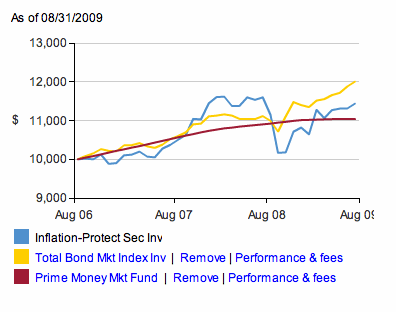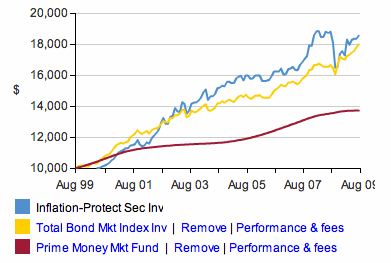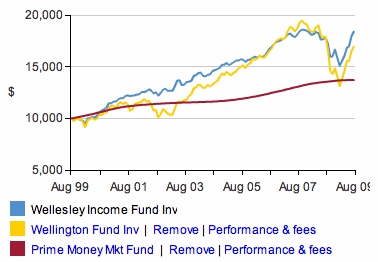Interesting observations Audrey. I'm not in Treasury's because the absolute rates are extremely low by historical standards and the real short/intermediate term TIPS rates are also low by historical standards. The spread is still wide between short Treasury's and short investment grade (see above table).
I'd rather be in short Treasury's for the safety but have sort of convinced myself that short investment grade is the way to go for now. If right it might give me an extra percent or two but the real action is in equities.
I agree that 100% short treasuries make no sense right now UNLESS you were already in them before the crisis started in which case stay put. They make no sense to switch into from something else because they are currently an overvalued asset class, not due to the low interest rate. If you are a total return investor you don't try to maximize the interest income from your bond funds.
I don't invest in TIPs. Some of my diversified bond funds do - but they move in and out based on perceived value. I never looked to TIPs for inflation protection - I don't believe they will provide such in the long run.
I prefer diversified bond funds to manage the bond allocation for me. I am currently building a position in VBISX (from DODIX), but it is very gradual and may take years because IMO I do need to average it out over a long cycle since it is a shift from one asset mix to another.
I don't like using a corporate only bond fund as my core bond fund. They are too closely correlated with equities IMO. My core bond fund DODIX surprised me by being quite a bit less diversified than I expected, going into the crisis heavily weighted in corporates and as a consequence suffered mightily. I notice that the Vanguard Intermediate Investment Grade did even worse and has only now not quite back up with VBISX since Jan 1 2008. The Vanguard intermediate-term index did much better over the period than the investment grade - it has almost caught up with DODIX (which has recovered big time so far this year).
I wanted a core bond fund that behaved well when equities swooned to increase the rebalancing benefit. The Vanguard intermediate-term bond index fund looks like a great mix and seems to behave pretty well over long periods, and it may be a great mix going forward even through an interest rate rising cycle. But it still had a pretty good dip during the crisis (as bad as DODIX although it recovered faster), and it is during these market swoons or economic slowdowns when I want to be able to rebalance. It's not fun rebalancing when your bond funds take a big hit too....

But then again, I don't switch around between bond funds in anticipation of changing market conditions. What makes me change is deciding that a certain fund is not meeting my long-term investment goals. After the recent crisis I did a careful review of bond funds and looked at what I needed and how things behaved in the long run, and I concluded that a short-term diversified index like VBISX was a much better match for my long term goals. Nevertheless, since we have just come out of a crisis where VBISX is "overvalued" relative to other bond funds, I have to make the transition gradual, otherwise I am just buying high and selling low.
I have no idea what is going to happen to different bond funds during the next interest rate rise cycle. As long as the economy improves and we have no financial crisis, investment grade will likely outperform other bond funds, and a continued steep yield curve means intermediate pay out more. However, the role of bond funds in my portfolio is to be there as a cushion for future financial crisis, so I need to reposition my bond allocation to better meet that goal.
Audrey





